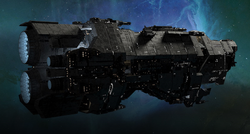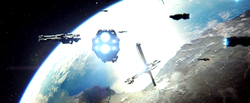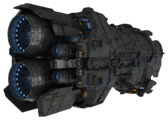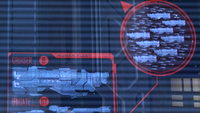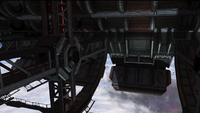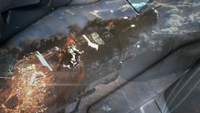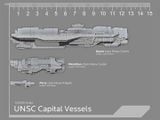Marathon-class heavy cruiser
From Halopedia, the Halo wiki
| Marathon-class heavy cruiser | |
|---|---|
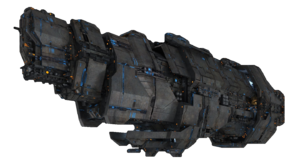
| |
| Production information | |
|
Class: |
|
|
Role: |
|
| Technical specifications | |
|
Length: |
1,192 meters (3,910 ft)[2] |
|
Width: |
|
|
Height: |
375 meters (1,230 ft)[3] |
|
Mass: |
|
|
Engine(s): |
|
|
Slipspace drive: |
|
|
Hull: |
191 cm of Titanium-A battle plate[7] |
|
Armament: |
|
|
Complement: |
|
| Chronological and affiliation | |
|
Era: |
|
|
Affiliation: |
|
The Marathon-class heavy cruiser is a cruiser classification in service with the UNSC Navy.[2] Ships of the Marathon class are designated with a hull classification symbol of CA,[5] indicating that vessels of the class are heavy cruisers. Marathon-class heavy cruisers are commonly reserved for use as command ships due to their durability and firepower,[1] and are often given attack and defense roles.[2] Rarely, these cruisers are deployed to assist forces of the United Nations Space Command in planetary invasion operations.[7]
Built as a replacement for the aging Halcyon-class light cruiser,[1] the Marathon class is nearly 1.2 kilometers in length, making it one of the largest warships used by the UNSC and often served as the backbone of a fleet. Due to their limited numbers, Marathon-class heavy cruisers are typically commanded by officers of the rear admiral rate or higher.[7]
Specifications
Superstructure and hull
At 1,192 meters (3,910 ft) long,[2] Marathon-class heavy cruisers are approximately three times the length of a typical frigate. Cruisers of the Marathon class were large vessels within the UNSC fleet, though they were dwarfed by their Covenant counterparts.[7] At 100,000 tons,[4] ships of the Marathon class have approximately three times the tonnage of their predecessors—the Halcyon-class light cruisers.[10] Marathon-class heavy cruisers have a similar profile to most cruisers within the UNSC Navy. Unlike the Halcyon class, the ventral surfaces of a Marathon class are concave rather than flat. Marathons have 191 centimeter-thick layers of Titanium-A armor, allowing them to sustain far greater damage than any frigate or destroyer.[7] Vessels of the Marathon class are renowned for their durability and extraordinary resilience.[1] Their ability to withstand massive amounts of damage, even from numerous blasts from plasma weaponry, made the Marathon class popular among UNSC officers.[7] By 2552, Marathons were considered to be the most powerful warship ever built by humanity.[11]
Like all warships of the UNSC Navy, Marathon-class heavy cruisers have a degree of operational flexibility through the use of modular mission packages and reconfigurable hangar bays. Though a rare configuration, cruisers of the Marathon class could be modified and equipped to function as a light carrier, sacrificing missile reloads and all of its cargo bays for additional hangar capacity.[12]
Crew and complement
Marathon-class heavy cruisers feature a standard complement of one thousand personnel. Due to their durability and firepower, ships of the Marathon class are often reserved for admirals to use as command ships. Although, they are occasionally commanded by a captain or a rear admiral.[7] Vessels of the class can also carry large UNSC Marine complements.[9]
Cruisers of the Marathon class are fitted with at least two hangar bays.[13][14] A large deployment bay containing numerous Single Occupant Exoatmospheric Insertion Vehicles, referred to by Orbital Drop Shock Troopers as "Hell's waiting room", is located amidships.[8] Marathons can carry two dozen GA-TL1 Longswords; space aboard a Marathon is optimized to maximize the amount of heavy weapons and armor equipped on each ship, preventing the cruisers from carrying more space fighters.[7] In addition, Marathon-class heavy cruisers can carry several D77-TC Pelican dropships and other ground and air vehicles.[9]
Armaments
Marathon-class heavy cruisers are equipped with two heavy Magnetic Accelerator Cannons as the primary armament of the class.[1][2] In addition to the class' MAC weaponry, these heavy cruisers are armed with a variety of other weapons that were once considered to outmatch the armaments of any other ship in service with the UNSC Navy.[2] The secondary armament of a Marathon-class heavy cruiser is its missile delivery system[1] which consists of 1,800 Archer missiles, as well as five fusion rockets.[7] The tertiary armament of the heavy cruiser class is a network of point-defense guns.[1] The Marathon class' vastly superior and larger armaments allowed it to outclass the Halcyon class in every way in terms of weaponry.[7]
Operational history
The Marathon-class heavy cruiser was commissioned and built as a replacement for the Halcyon-class light cruiser,[7] a smaller and lighter armed cruiser with excessive production costs.[2] After a brief era of service,[1] most ships of the Halcyon class were decommissioned, which led to the Marathon class rising to prominence. By 2525, the Marathon class was the most popular line of cruiser in service with the Navy.[2] Several Marathon-class heavy cruisers served in Battle Group X-Ray under Vice Admiral Preston Cole during the Battle of Harvest. Throughout the early years of the Human-Covenant War, Cole continued to command Marathons as part of his Third Fleet. Several Marathons from the fleet, including UNSC Prophecy, participated in the Harvest campaign.[13][15] At least one Marathon-class heavy cruiser, UNSC Dresden, participated in the Battle of Biko, where it was destroyed by the Covenant.[6]
As their numbers were diminished by the onslaught of the Covenant, many Marathons were reassigned to the defense of the Inner Colonies and Earth during the later years of the Human-Covenant War.[16][note 2] Marathons were present at the Battle of Sigma Octanus IV in July 2552, including Vice Admiral Michael Stanforth's flagship Leviathan,[11] which was severely damaged during the battle.[17] Numerous Marathon-class heavy cruisers participated in the Fall of Reach, many of which were destroyed, including Stanforth's Leviathan.[7][14][18]
At least eight Marathon-class cruisers—including UNSC Canberra[5] and Say My Name[19]—assigned to the Fifth Fleet, a part of the UNSC Home Fleet, were present at the onset of the Battle of Earth. Led by Fleet Admiral J. Harper aboard Canberra and supported by sixty-seven Stalwart-class light frigates, these ships formed a defensive perimeter around the orbital defense platform cluster over the Mediterranean to prevent the Fleet of Sacred Consecration from reaching Earth's surface.[20] Admiral Carl Patterson's battle group, drawn from the Home Fleet, contained one Marathon-class heavy cruiser that participated at the Battle of Onyx, where it was destroyed with the rest of its battle group.[21] Several Marathon-class cruisers of the Home Fleet were supposedly destroyed over the course of the battle for Earth, particularly after the final wave of Covenant reinforcements arrived.[22]
Most remaining Marathon-class heavy cruisers were decommissioned after the Autumn-class heavy cruiser was introduced, with only a handful staying in service.[23] The Autumn class became slated to serve as the core of the reconstituted UNSC Navy's fleet, a role that the Marathon class had previously fulfilled.[1] A Marathon-class heavy cruiser served as the flagship of Admiral Tuwa during an operation on Gao in 2553. The presence of the cruiser prevented Minister of Protection Arlo Casille from taking naval action against the UNSC, realizing that the cruiser could easily decimate his entire fleet of patrol corvettes.[24]
Ships of the line
- UNSC Canberra – Fleet Admiral J. Harper's flagship; led the Fifth Fleet against the Covenant during the Battle of Earth on October 20, 2552.[5]
- UNSC Dresden – Equipped with a saddle box drive. Destroyed during the Battle of Biko in 2526.[6]
- UNSC Feeling Lucky – Part of the Fifth Fleet; destroyed during the Battle of Earth on October 20, 2552.[25]
- UNSC Hannibal – Destroyed during the Fall of Reach.[7][18]
- UNSC Leviathan – Vice Admiral Michael Stanforth's flagship. Severely damaged during the Battle of Sigma Octanus IV in July 2552 and destroyed during the Fall of Reach.[26]
- UNSC Marathon – The lead ship of the class.[27]
- UNSC Prophecy – Destroyed during the Harvest campaign in February 2531.[13][15]
- UNSC Say My Name – Deployed ODSTs to board Solemn Penance during the Battle of Mombasa on October 20, 2552.[8][19]
Halo: Fleet Battles
UNSC Marathon Heavy CruiserThis element includes a single Marathon-class heavy cruiser.
UNSC Supported Marathon Heavy CruiserThis element includes a Marathon-class heavy cruiser and one Paris-class heavy frigate.
|
UNSC Reinforced Marathon Heavy CruiserThis element includes a Marathon-class heavy cruiser and two Paris-class heavy frigates.
UNSC Paired Marathon Heavy CruisersThis element features two Marathon-class heavy cruisers.
|
Trivia

|
Browse more images in this article's gallery page. |
- Though in-universe the class is likely named for the Battle of Marathon, in reality its name is a reference to Bungie's Marathon trilogy and its eponymous ship, the UESC Marathon.
- The Marathon class is featured in Halo: Fleet Battles; although the Halcyon-class light cruiser was originally intended to appear instead, it was decided that the latter's appearance would not be canonically possible. The design for the Marathon class in the game was noted to have been difficult to sculpt, although the models created by Blur Studio for Halo 2: Anniversary aided in the process.[28]
Gallery
- UNSC Prophecy.png
UNSC Prophecy
ODSTs gathered around a holo-table inside a Marathon-class cruiser
A Marathon class is destroyed in the Halo: The Master Chief Collection announcement trailer
A Marathon hull being pierced by a CAS-class assault carrier's energy projector
The Marathon's scale compared to that of the Epoch class and the Paris class
- HFB-Marathonduo.png
Marathon-class heavy cruisers in Halo: Fleet Battles.
Profile of a Marathon in Halo Mythos.
List of appearances
|
Notes
- ^ Halo: Ghosts of Onyx states that the Marathon-class cruiser has a mass of 100,000 tons. However, given that the Marathon class is over 3.5 times longer than a modern Nimitz-class aircraft carrier, which also has a mass of 100,000 tons, as well as being nearly four times wider and many times taller, this tonnage seems unrealistic. Though this mass figure is perhaps a result of future construction materials or weight-saving design, it is more likely an oversight by author Eric Nylund.
- ^ According to Halo: The Fall of Reach, as of July 2552, UNSC Leviathan was one of twenty cruisers left in the Fleet, presumably referring to the entire Navy. Even if one assumes that this refers only to FLEETCOM Sector One, this number is clearly retconned in later media.
Sources
- ^ a b c d e f g h i j k Halo Waypoint: UNSC Cruiser
- ^ a b c d e f g h i j k Halo: The Essential Visual Guide, page 42
- ^ a b 3D model data from Halo 2
- ^ a b Halo: Ghosts of Onyx, page 53
- ^ a b c d Halo 2: Anniversary, campaign level Cairo Station
- ^ a b c Halo: First Strike, "Tug o' War", page 413 (2010)
- ^ a b c d e f g h i j k l m n o p Halo Encyclopedia, page 251 (2011)
- ^ a b c Halo 3: ODST, campaign level Prepare to Drop
- ^ a b c Halo: The Fall of Reach, page 242 (2010)
- ^ Halo: The Fall of Reach, page 270 (2010)
- ^ a b Halo: The Fall of Reach, page 188 (2010)
- ^ Halo: Fleet Battles, Core Rulebook - page 125
- ^ a b c Halo Wars: Genesis
- ^ a b Halo: Fleet Battles, Stats
- ^ a b Halo Wars, Timeline
- ^ Halo: The Fall of Reach, page 162
- ^ Halo: The Fall of Reach, page 224 (2010)
- ^ a b Halo: First Strike, page 168 (2003), page 206 (2010)
- ^ a b Halo Waypoint: UNSC Say My Name (defunct, backup on Archive.org)
- ^ Halo 2, campaign level Cairo Station
- ^ Halo: Ghosts of Onyx, pages 292, 333
- ^ Halo 3, campaign level Crow's Nest
- ^ Halo 4: The Essential Visual Guide, page 191
- ^ Halo: Last Light, page 71
- ^ Halo Waypoint: Canon Fodder - Fifty Caliber
- ^ Halo Waypoint: Michael Stanforth
- ^ Stephen Loftus on the Autumn class' talk page
- ^ Halo Waypoint: Canon Fodder: In the Loop
